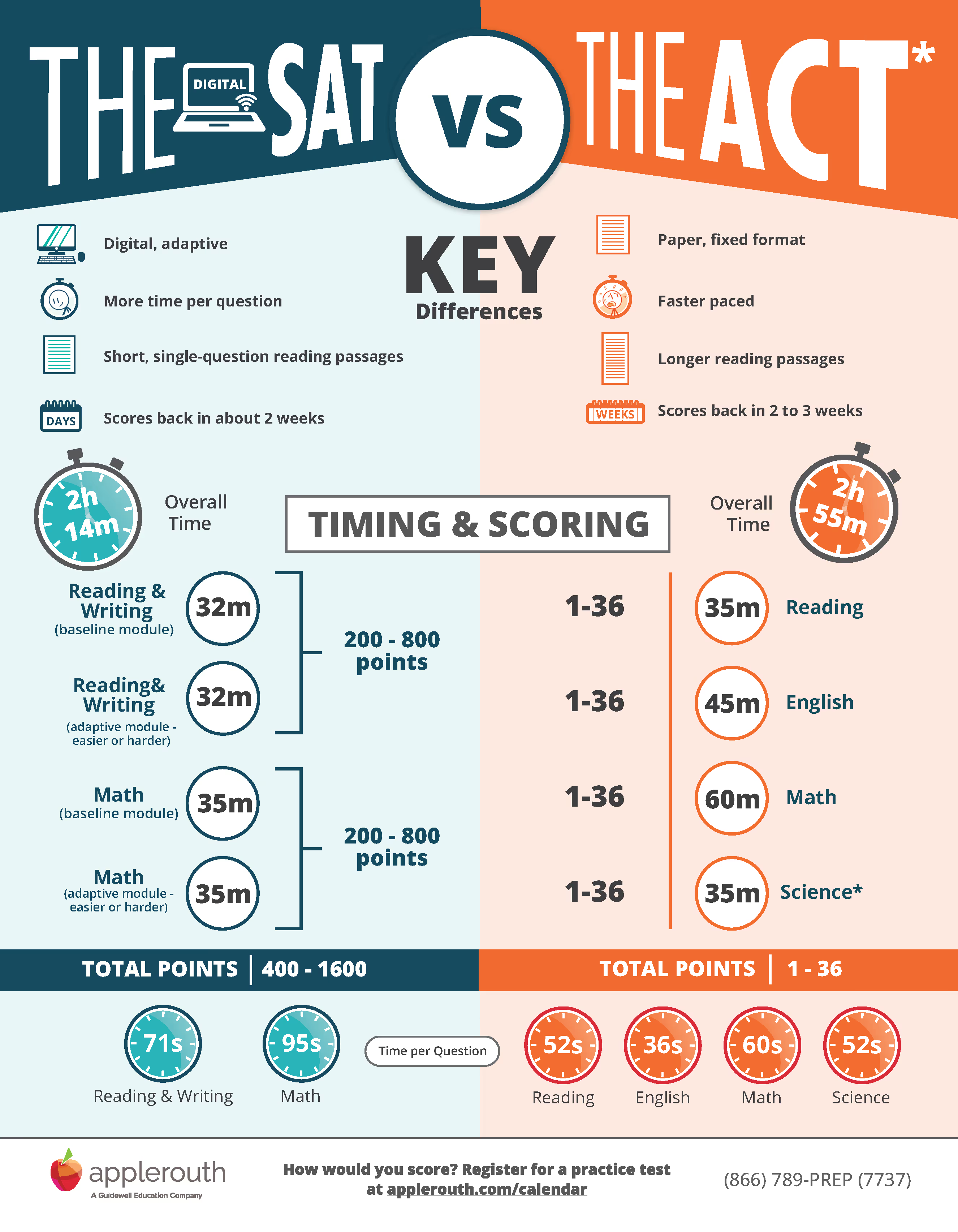One test isn’t “better” — the right one is the one that fits your student.
When deciding between the SAT vs ACT, it helps to understand the key differences, formats, and scoring systems. Colleges accept both tests, so skip the guesswork — use this quick, fact-based guide to see how the SAT and ACT differ and find which one fits your student’s strengths.
SAT vs ACT: 10 Facts to Choose the Right Test for Your Student
1. Acceptance: Do Colleges Prefer SAT or ACT?
Every U.S. college accepts both the SAT and ACT equally. Students should choose based on which test plays to their abilities.
2. Format: Digital vs Paper
The SAT is fully digital and adaptive; the ACT remains fixed in both the paper-based and digital format (which students select when registering). Tech-savvy students may find the SAT’s format smoother.
3. Timing & Pacing: Which Test Offers More Time?
The SAT takes 2h 14m, while the ACT takes 2h 5m (the optional Science sections adds an extra 40m).
The SAT allows slightly more time per question; the ACT moves faster. Students who work quickly may thrive on the ACT, while those who prefer careful reasoning often prefer the SAT.
4. SAT vs ACT Math: Depth & Breadth
The SAT emphasizes algebra and data analysis; the ACT includes geometry, trigonometry, and some precalculus. The ACT covers more ground, while the SAT digs deeper.
5. SAT vs ACT Reading & Writing: Short vs Long Passages
The SAT combines reading and grammar into short, focused passages. The ACT separates English (grammar) and Reading, using longer passages that test stamina.
6. Science: How Is It Tested on Each Exam?
Only the ACT has a separate Science section, which is optional (although we recommend students still take it). The SAT integrates scientific reasoning into other questions. Choose based on your student’s comfort with data and charts.
7. SAT Score vs ACT Score: Different Scales, Same Goal
The SAT is scored between 400–1600 total points (200–800 per section), while the ACT is scored on a composite scale of 1–36 (which takes the average of the three required section scores).
If you’re comparing SAT vs ACT scores, they can be converted using concordance charts for easy comparison.
8. Superscoring Policies: You Control What College See
Most colleges superscore both tests—combining your student’s best section results. You can also choose which test dates to send.
9. SAT vs ACT Prep Strategies: Strategy vs Speed
The SAT rewards pattern recognition and logic; the ACT rewards pacing and endurance. Prep plans should reflect those differences.
10. How to Choose: Should I Take SAT or ACT?
Sign up today to take a free, full-length SAT and ACT practice test.
Then, use our detailed score reports to compare scores, pacing, and comfort before committing to the best-fit test.
FAQs: Common SAT vs ACT Questions
Should I take the SAT or ACT?
Take a free practice test for each. Compare your scores and pacing. Choose the exam where you feel most confident and perform more consistently.
Is the SAT or ACT easier?
Neither is easier overall — the SAT rewards reasoning and adaptability, while the ACT favors quick recall and speed.
Do colleges prefer SAT or ACT?
No. All accredited U.S. colleges accept both. Choose the test that fits your learning style and strengths.
Which is better: SAT or ACT?
Neither test is “better” — the best choice is the one that matches your goals, timing, and comfort with digital or paper formats.
Can I compare my SAT and ACT scores?
Yes. Use an SAT vs ACT comparison chart (available on College Board and ACT websites) to align scores accurately.






.webp)



